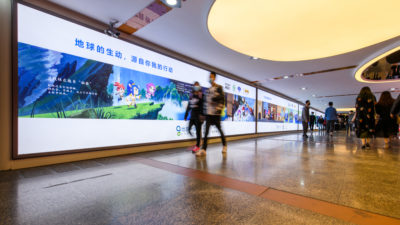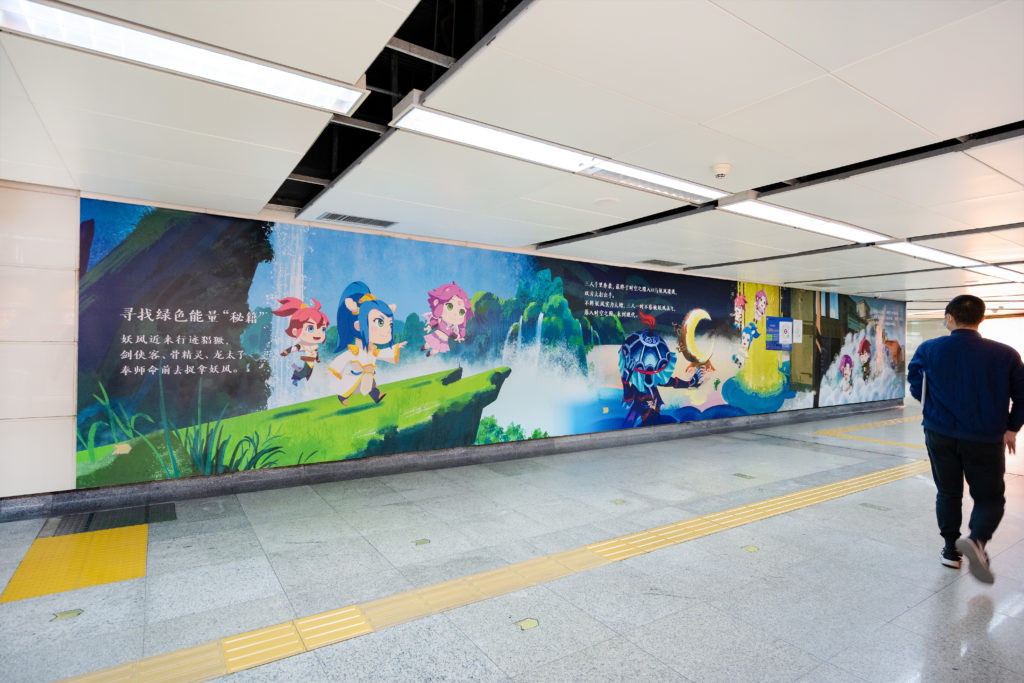
To coincide with the COP 26 climate summit, WildAid launched a new campaign in Beijing, Shanghai, Guangzhou and Shenzhen to inspire younger generations to reduce carbon emissions through daily choices regarding transport. This new campaign kicked off with a 32-meter long comic strip displayed in Shanghai’s landmark People’s Square on October 30. The campaign has been produced in partnership with China Green Carbon Foundation, China Association for NGO Cooperation, and Netease’s famous cartoon series Dream Academy.
This comic strip tells the story of three characters from Dream Academy as they travel from the “Dream Land” to a modern city to find ways to reduce carbon emissions since the high emissions from cities had made the “Dream Land” no longer peaceful. Based on data supported by World Resources Institute, three methods were found to reduce emissions from transportation: Avoid– to build a life circle- residents can find everything they need for their daily lives within a 15-minute bike ride; Shift– to move from private cars or taxis to walking, bicycles, buses, subways and other low-emission transports; and Improve– to purchase or use electric vehicles.


Transportation is the third largest source of carbon emissions in the world, accounting for approximately 24% of total global emissions. According to data released by China’s National Development and Reform Commission, China’s total carbon emissions in the transportation sector in 2019 were about 1.1 billion tons, accounting for about 10% of the country’s total carbon emissions. And 40% of the emissions in urban transportation is contributed by small cars, according to Planning Research Institute of the Ministry of Transport of China. During COP26, China published two key documents: a guiding document on the country’s climate action and an action plan on peaking emissions. These two government releases are parts of China’s “1+N” policy framework, the national directives to help it peak carbon emissions before 2030 and achieve carbon neutrality before 2060.
“WildAid expects that COP26 can provide an ambitious and executable roadmap for global climate governance, and promote the transformation of the low-carbon consumption and production methods around the world,” said John Baker, WildAid, Chief Program Officer.
“After years of efforts, the public has finally started to understand what ‘Green Transportation’ means,” said Yu Chong, Chief Representative of WildAid China. “But it is still a lot thing to do to strengthen the communication based on science and effectiveness to make up the gap in people’s mind of the emissions from consumer side and the China’s “dual-carbon” goal, and to provide the public with more choices and services for participating in low-carbon lifestyles, and transforming low-carbon awareness into climate action involving everyone.”
The campaign materials will be placed in high traffic areas through COP26, which we expect to garner over 11 million impressions. Placed at the Shanghai subway Renmin Place station in the center of Shanghai, which serves over 500,000 passengers per day, we expect our billboard to garner 7 million impressions. Our other major billboard placement is in Shenzhen subway Shimin Center station, also a super busy station in town, with over 140,000 passengers per day, where we expect our billboard will receive approximately 4 million impressions.


Stay in touch and get the latest WildAid updates.
SIGN UPAbout WildAid
WildAid is a non-profit organization with a mission to protect wildlife from illegal trade and other imminent threats. While most wildlife conservation groups focus on protecting animals from poaching, WildAid primarily works to reduce global consumption of wildlife products such as elephant ivory, rhino horn and shark fin soup. With an unrivaled portfolio of celebrity ambassadors and a global network of media partners, WildAid leverages more than $308 million in annual pro-bono media support with a simple message: When the Buying Stops, the Killing Can Too.
Journalists on deadline may email communications@wildaid.org